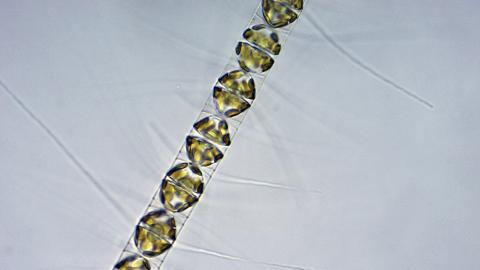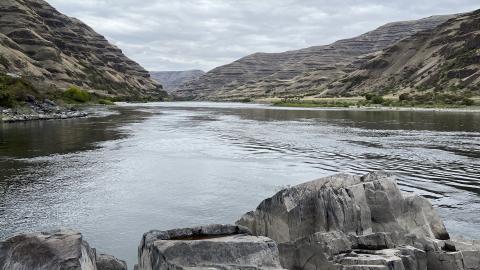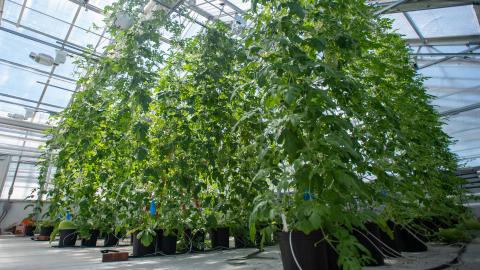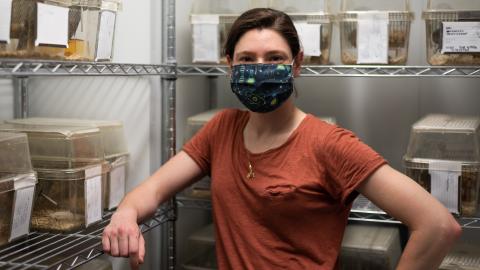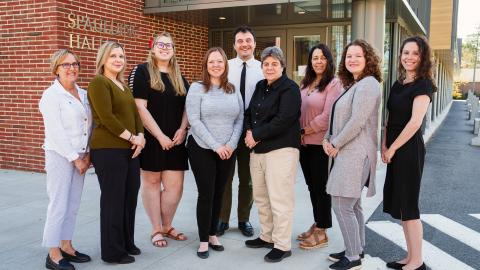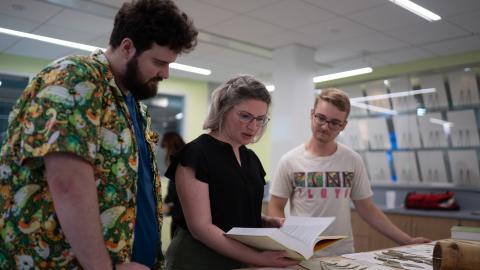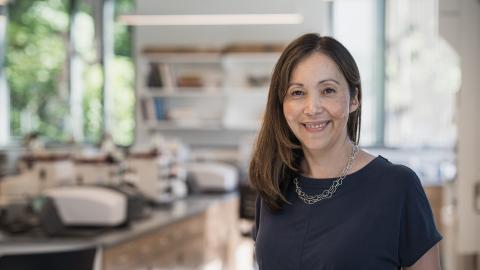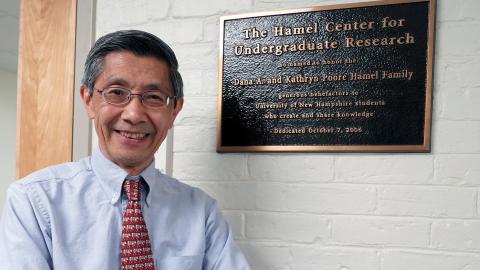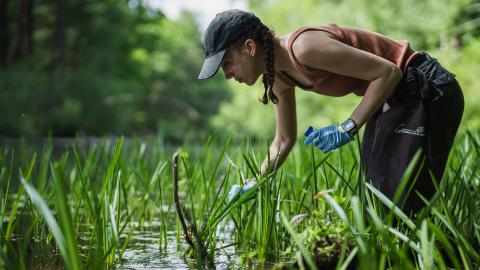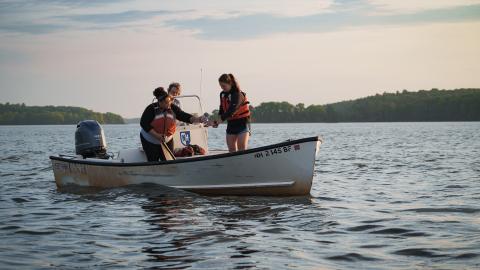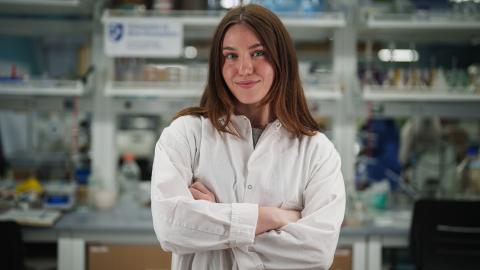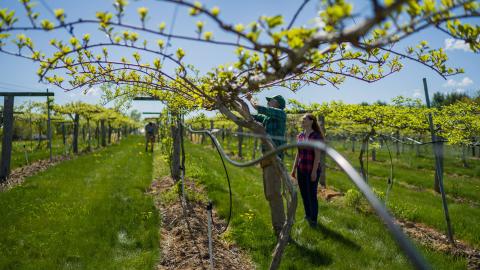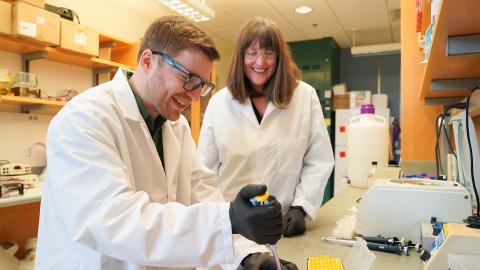Microscopic Plants Foretell Decline
Associate professor Elizabeth Harvey and her team study phytoplankton in the Gulf of Maine to understand how climate change will impact marine ecosystems. These microscopic plants play a key role in regulating the marine food web, and the research focuses on how climate change could affect their populations and the broader marine environment. Read more
Rethinking Maps to Include Indigenous Perspectives
UNH researchers are creating maps that incorporate indigenous knowledge to improve land management practices. Doctoral student Kristin Green and Associate Professor Teresa Cavazos Cohn collaborate with tribal nations to develop maps that can guide national forest planning and promote more effective collaboration with indigenous communities. Read more
Reducing the Cost & Environmental Impact of Indoor Farming
Assistant Professor Md Sazan Rahman and his team are developing sustainable technologies for controlled environment agriculture. Their porous concrete substrate with embedded coils supports hydroponic farming while reducing energy use, operational costs, and the carbon footprint of indoor food production. Read more
Cactus Mice Offer Insight into Potential Climate Change Adaptations
Professor Matthew MacManes and PhD graduate Dani Blumstein studied cactus mice, revealing how these desert-adapted animals survive by eating less and conserving water. Their findings could help inform conservation strategies for non-desert-adapted species facing increased water stress due to climate change. Read more
Student Success: Priority #1
COLSA’s Student Success Hub provides comprehensive advising and career services, guiding students from freshman year to graduation. The hub offers support in academic planning, research, and career development, ensuring that students are well-prepared to succeed in their future educational or professional paths. Read more
Where Every Specimen Tells a Story
The UNH Albion R. Hodgdon Herbarium and Insect Collection house over one million specimens, supporting research and conservation. A recent study identified a now-extinct native crabgrass species, highlighting the critical role of natural history collections in biodiversity preservation and understanding environmental changes. Read more
Mighty Mitochondria
COLSA alumna Marcia Haigis ’96, now a professor at Harvard, discovered that cancer cells recycle ammonia to fuel their growth. This breakthrough in understanding cancer metabolism earned her the 2023 Samsung Ho-Am Prize in Medicine, recognizing her contributions to cancer research and human health. Read more
Leading Research, Making an Impact
Paul Tsang, professor at COLSA and former faculty director of the Hamel Center for Undergraduate Research, discusses how the center’s research programs provide students with critical, hands-on experiences. These opportunities help develop skills in problem-solving, critical thinking, and resilience, preparing students for future academic and professional success. Read more
Bioscience Boon
The recently completed Spaulding Biosciences Project added 47,000 square feet to Spaulding Hall and renovated the existing space, providing state-of-the-art labs and research facilities. This expansion enhances UNH’s ability to conduct high-impact bioscience research and strengthens partnerships with public and private sectors. Read more
Spaulding Hall: A Look Back
Completed in 1960, the original 82,000-square-foot Spaulding Life Science building housed the biochemistry, bacteriology, and zoology departments. Named after Governor Huntley N. Spaulding and his family, it underwent a limited laboratory renovation in 1995 to update some of its facilities. Read more
Duckweed Discovery
Assistant Professor Anna O’Brien is studying the use of duckweed as green manure to reduce the need for chemical fertilizers. Duckweed’s ability to recapture nutrients in agricultural runoff could provide a sustainable alternative, improving water quality and supporting crop growth with fewer environmental impacts. Read more
Microplastic, Macro Problem
A team led by Professor Bonnie Brown and Associate Professor Gregg Moore is investigating microplastics in key Northeast estuaries, including Great Bay and Hampton-Seabrook. Their research focuses on understanding how these tiny particles accumulate and what impacts they may have on estuarine ecosystems and marine life. Read more
Undergraduate Spotlight: Gabrielle Jarrett
Gabrielle Jarrett ’24 researched microplastic deposits in New Hampshire’s Hampton-Seabrook Estuary for her capstone project. She presented her findings at the UNH Undergraduate Research Conference, earning recognition for her outstanding oral presentation. Gabrielle’s work helped refine her skills in data analysis and lab procedures. Read more
Fruits of Innovation
Kiwiberries, a cold-hardy, nutrient-rich fruit, have potential as a high-value crop in the Northeast. Since 2013, Iago Hale has tested nearly 200 varieties at UNH’s Woodman Farm. His work has led to a commercial license, set to drive the production and distribution of kiwiberries and transform regional agriculture. Read more
Tracking Microplastics in New Hampshire's Estuaries
Two UNH faculty, two graduate students and several undergrads are working together to establish baseline data on microplastics in New Hampshire’s estuaries. These coastal regions, which provide critical nesting and breeding habitats for many animal species and serve as important ecosystems for cleaning and filtering ocean waters, are also known to trap and retain microplastics.
THRIVE Fall 2024
Published in October 2024
THRIVE is published by the UNH College of Life Sciences and Agriculture. Our goal is to inspire and inform our alumni, friends, faculty, staff and partners by sharing college news and celebrating the achievements of our faculty, alumni and students as we work to continuously strengthen our commitment to teaching, research and public service.
